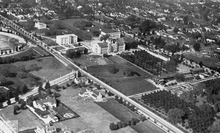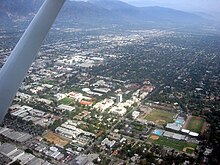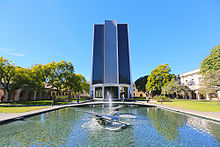Campus Of The California Institute Of Technology
Campus history




In 1917 Hale hired architect Bertram Goodhue to produce a master plan for the 22 acres (8.9 ha) campus. Goodhue conceived the overall layout of the campus and designed the physics building, Dabney Hall, and several other structures, in which he sought to be consistent with the local climate, the character of the school, and Hale's educational philosophy. Goodhue's designs for Caltech were also influenced by the traditional Spanish mission architecture of Southern California.
During the 1960s, Caltech underwent considerable expansion, in part due to the philanthropy of alumnus Arnold O. Beckman. In 1953, Beckman was asked to join the Caltech Board of Trustees. In 1964, he became its chairman. Over the next few years, as Caltech's president emeritus David Baltimore describes it, Arnold Beckman and his wife Mabel "shaped the destiny of Caltech".
The Beckmans made a major gift to Caltech in 1962, when they funded the construction of the Beckman Auditorium, a concert hall designed by architect Edward Durrell Stone. When the circular white stone hall opened with a gala concert on February 25, 1964, it was praised for its acoustics.
The auditorium was the first of several expansions at Caltech that the Beckmans supported. In 1974, the Beckman Laboratory of Behavioral Biology (BBB) was dedicated. The building was seen as a significant step towards the establishment of a new program focusing on neurobiology and a multi-leveled understanding of brain and its mechanisms at the chemical, cellular, and systems levels. On April 25, 1986, the Beckman Laboratory of Chemical Synthesis was dedicated. The Beckmans' gift supported not only the building, but also the installation of state-of-the-art scientific instrumentation in six customized laboratories. Finally, the Beckmans funded the Beckman Institute, a multi-disciplinary center for research in the chemical and biological sciences. In 1986, Beckman agreed to donate $50 million towards the institute and its endowment. Designed by architect Albert C. Martin, Jr. in a Spanish style, the Beckman Institute was dedicated on October 26, 1989, and opened in 1990.
In 1971 a magnitude-6.6 earthquake in San Fernando caused some damage to the Caltech campus. Engineers who evaluated the damage found that two historic buildings dating from the early days of the Institute—Throop Hall and the Goodhue-designed Culbertson Auditorium—had cracked. These were some of the first reinforced concrete buildings, and their plans did not contain enough details (such as how much reinforcing bar had been embedded in the concrete) to be sure they were safe, so the engineers recommended demolition. However, demolishing these historic structures required considerably more effort than would have been necessary had they been in real danger of collapse. A large wrecking ball was used to demolish Throop Hall, and smashing the concrete revealed massive amounts of rebar, far in excess of safety requirements. The rebar had to be cut up before the pieces could be hauled away, and the process took much longer than expected.
New additions to the campus include the Cahill Center for Astronomy and Astrophysics and the Walter and Leonore Annenberg Center for Information Science and Technology, which opened in 2009, and the Warren and Katherine Schlinger Laboratory for Chemistry and Chemical Engineering followed in March 2010. The Institute also concluded an upgrading of the South Houses in 2006. In late 2010, Caltech completed a 1.3 MW solar array projected to produce approximately 1.6 GWh in 2011.
Notable buildings


Athenaeum
The Athenaeum is a faculty club and private social club on the California Institute of Technology campus in Pasadena, California. It was designed by Gordon Kaufmann in the Mediterranean Revival style, with landscape design by Florence Yoch and Lucile Council, and opened in 1930. It includes a restaurant, a private hotel with several named suites (e.g. The Einstein Suite, where Albert Einstein lived while at Caltech), and serves as Caltech's Faculty Club.
Guggenheim Aeronautical Laboratory
The Guggenheim Aeronautical Laboratory at the California Institute of Technology (GALCIT), was a research institute created in 1926, at first specializing in aeronautics research. In 1930, Hungarian scientist Theodore von Kármán accepted the directorship of the lab and emigrated to the United States. Under his leadership, work on rockets began there in 1936. GALCIT was the first—and from 1936 to 1940 the only—university-based rocket research center. Based on GALCIT's JATO project at the time, the Jet Propulsion Laboratory was established under a contract with the United States Army in November 1943.
In 1961 the GALCIT acronym was retained while the name changed to Graduate Aeronautical Laboratories at the California Institute of Technology. In 2006, during the Directorship of Ares Rosakis, GALCIT was once again renamed, taking on the new name Graduate Aerospace Laboratories of the California Institute of Technology (while continuing to maintain the acronym GALCIT) in order to reflect its vigorous re-engagement with space engineering and with JPL.
Beckman Institute

The Beckman Institute at Caltech is a multi-disciplinary center for research in the chemical and biological sciences. Founding of the Beckman Institute at Caltech was supported by a major philanthropic gift from the Arnold Orville Beckman and his wife Mabel, through the Arnold and Mabel Beckman Foundation. Beckman had a long-term relationship with Caltech as a student, teacher and trustee. After discussions with chemists Harry B. Gray and Peter Dervan, and biologists Eric H. Davidson and Leroy Hood, Beckman announced in 1986 that he would donate $50 million to establish the institute and an accompanying endowment. The Beckman Institute at Caltech was chartered by Caltech in 1987.
The institute building was designed by architect Albert C. Martin Jr. in a Spanish style with a pool and a central courtyard. It was dedicated on October 26, 1989, and opened in 1990. The building included four levels of laboratory space, libraries, and archives.
List of buildings
This list includes buildings and facilities of California Institute of Technology. The listing does not include off-campus/co-owned properties. Demolished buildings are shown in grey.
| Photo | Name | Opened | Notes | Add'l refs |
|---|---|---|---|---|

|
Throop Hall | 1910 | Originally Pasadena Hall. Damaged in the 1971 San Fernando earthquake, demolished in 1973 | |

|
Old Dormitory | 1910 | Constructed elsewhere in Pasadena, moved to Caltech campus in 1915. Demolished in 1962, replaced by Winnett Student Center | |

|
Parsons–Gates Hall of Administration | 1917 | Originally Gates Laboratory of Chemistry. The oldest existing building on campus. The 1917 portion of Gates was damaged in the 1971 San Fernando earthquake, and was rebuilt in 1983 as the Parsons-Gates Hall of Administration. Named for C. W. Gates, P. G. Gates, and Ralph M. Parsons. | |

|
Culbertson Hall | 1921 | Intended to be the east wing of a larger auditorium that was never built. Severely damaged in the 1971 San Fernando earthquake, it was demolished in 1972. South Mudd was built on its site. | |

|
Norman Bridge Laboratory of Physics | 1922, 1924, 1925 | Named for Norman Bridge | |

|
Steam Laboratory | 1925 | Demolished in 1996, replaced by Sherman Fairchild Laboratory | |

|
Alfred P. Sloan Laboratory of Mathematics and Physics | 1925 | Originally the High Voltage Research Laboratory, which was retired and rebuilt in 1960 into its configuration as Sloan. The interior was again stripped entirely and remains under renovation as of 2018. Named for Alfred P. Sloan. | |

|
Gates Annex | 1927 | ||

|
Dabney Hall | 1928 | Named for Joseph B. Dabney | |

|
William G. Kerckhoff Laboratories of the Biological Sciences | 1928, 1939, 1948 | Named for William G. Kerckhoff | |

|
Guggenheim Aeronautical Laboratory | 1929 | Funded by Daniel Guggenheim Fund for the Promotion of Aeronautics | |

|
Athenaeum | 1930 | The faculty club. Albert Einstein stayed in the loggia during his annual winter visits to Caltech. | |

|
South Houses | 1931 | Undergraduate houses, including Blacker House, Dabney House, Fleming House, and Ricketts House. Partially renovated in 2006. The houses are named after Robert R. Blacker, Joseph B. Dabney, Arthur H. Fleming, and L. D. Ricketts. All affiliated with the undergraduate house system. | |

|
W. K. Kellogg Radiation Laboratory | 1932 | Named for Will Keith Kellogg | |

|
Ronald and Maxine Linde Laboratory for Global Environmental Science | 1932 | Originally Henry M. Robinson Laboratory of Astrophysics; transformed into its current configuration in 2011 and renamed Linde + Robinson Laboratory for Global Environmental Science; received current name in 2021 | |

|
Synchrotron Building | 1933 | Originally the Optical Shop | |
| Machine Shop | 1933 | Demolished in 1969, replaced by Downs and Lauritsen Laboratories | ||

|
Crellin Laboratory of Chemistry | 1937 | Named for Mr. and Mrs. E. W. Crellin | |

|
Charles Arms Laboratory of the Geological Sciences | 1938 | Named for Charles Arms, father of Mrs. Henry Robinson | |

|
Seeley W. Mudd Laboratory of the Geological Sciences | 1938 | Also known as North Mudd. Named for Seeley W. Mudd. | |

|
Gates–Thomas Laboratory of Engineering | 1945, 1950 | Named for Franklin Thomas and Charles Gates Jr. | |

|
Earhart Plant Research Laboratory | 1949 | Site of the phytotron, the Earhart Laboratory featured the first completely controllable enclosed plant growth chambers, used to establish the ecological niche of the tomato plant. The building was demolished in 1973 | |

|
Alumni Swimming Pool | 1954 | ||

|
Scott Brown Gymnasium | 1954 | ||

|
Norman W. Church Laboratory for Chemical Biology | 1955 | ||

|
Eudora Hull Spalding Laboratory of Engineering | 1957 | ||

|
Archibald Young Health Center | 1957 | ||

|
Physical Plant Building and Shops | 1959 | ||

|
Gordon A. Alles Laboratory for Molecular Biology | 1960 | Named for Gordon Alles, the inventor of amphetamine drugs. | |

|
North Houses | 1960 | Undergraduate houses, including. Lloyd House, Page House, and Venerable House (formerly Ruddock House). All affiliated with the house system. | |

|
Lee F. Browne Dining Hall | 1960 | Formerly the Harry Chandler Dining Hall; name changed by the board of trustees in 2021 due to Chandler's involvement with the eugenics movement. | |

|
W. M. Keck Engineering Laboratories | 1960 | Funded by W. M. Keck Foundation | |

|
Campbell Plant Research Laboratory | 1960 | The facility included a research greenhouse. Built with funds provided by the Campbell Soup Company. The greenhouse was later used for art classes. The building was demolished in 1996. | |

|
Graduate houses | 1961 | Originally included Braun House, Keck House, Marks House, and Mosher–Jorgensen House. Keck and Mosher–Jorgensen were converted into the Center for Student Services in 2000 and 2002 respectively. Braun and Marks were temporarily used to house undergraduates from the South Houses from 2004 to 2006 during renovations, and were repurposed as house-unaffiliated undergraduate housing in 2006. | |

|
Kármán Laboratory of Fluid Mechanics and Jet Propulsion | 1961 | Named for Theodore von Kármán | |

|
Firestone Flight Sciences Laboratory | 1962 | Named for Firestone Tire and Rubber Company | |

|
Winnett Student Center | 1962 | Demolished in 2017, replaced by Hameetman Center | |

|
Powell-Booth Laboratory for Computational Science | 1963 | Originally the Willis H. Booth Computing Center, renovated in 1999. Named for Willis H. Booth and Charles Lee Powell | |

|
Beckman Auditorium | 1964 | Named for Arnold Orville Beckman | |

|
Harry G. Steele Laboratory of Electrical Sciences | 1965 | ||

|
Central Engineering Services Building | 1966 | ||

|
Caltech Hall | 1967 | Formerly named Robert A. Millikan Memorial Library; name changed by the board of trustees in 2021 due to Millikan's involvement with the Human Betterment Foundation and the eugenics movement. | |

|
Arthur Amos Noyes Laboratory of Chemical Physics | 1967 | Named for Arthur Amos Noyes | |

|
Central Plant | 1967 | ||

|
George W. Downs Laboratory of Physics and Charles C. Lauritsen Laboratory of High Energy Physics | 1969 | Named for George W. Downs and Charles Christian Lauritsen | |

|
Keith Spalding Building of Business Services | 1969 | ||

|
Donald E. Baxter, M.D., Hall of the Humanities and Social
Sciences |
1971 | Includes Ramo Auditorium, named for Simon Ramo | |

|
The Earle M. Jorgensen Laboratory of Information Science | 1971, 2012 | Complete renovation in 2012; now Jorgensen Laboratory for sustainability research | |

|
The Mabel and Arnold Beckman Laboratories of Behavioral Biology | 1974 | Named for Arnold Orville Beckman | |

|
Seeley G. Mudd Building of Geophysics and Planetary Science | 1974 | Also known as South Mudd. Named for Seeley G. Mudd. | |

|
Clifford S. and Ruth A. Mead Memorial Undergraduate Chemistry Laboratory | 1981 | Demolished in November 2021, it is slated to be replaced by the Resnick Sustainability Resource Center. Mead was constructed by demolishing an old two-story house that had served as a gathering place for Biology Division students and, later, the former Caltech Coffee House. | |

|
Thomas J. Watson, Sr., Laboratories of Applied Physics | 1982 | Named for Thomas J. Watson | |

|
Braun Laboratories in Memory of Carl F. and Winifred H. Braun | 1982 | ||

|
Athletic Facility | 1984 | ||

|
Catalina Graduate Apartment Complex | 1984, 1986, 1988 | ||

|
David W. Morrisroe Astroscience Laboratory | 1986 | Originally the Infrared Processing and Analysis Center, renamed in 1995 | |

|
Wilson Avenue North Parking Structure | 1987 | ||

|
Beckman Institute | 1989 | Named for Arnold Orville Beckman | |

|
Braun Athletic Center | 1992 | ||

|
Holliston Avenue Parking Structure/Satellite Utility Plant | 1993 | ||

|
The Gordon and Betty Moore Laboratory of Engineering | 1996 | Named for Gordon Moore and Betty Moore | |

|
Avery House | 1996 | Named for R. Stanton Avery. Originally housed a mixture of graduate and upperclassmen undergraduate students with faculty-in-residence. Began housing freshmen in 2006. Now affiliated with the house system and houses undergraduates with faculty-in-residence. | |

|
Sherman Fairchild Library of Engineering and Applied Science | 1997 | Funded by Sherman Fairchild Foundation | |

|
Wilson Avenue South Parking Structure | 1999 | ||

|
Financial Services Building | 2000 | ||

|
Broad Center for the Biological Sciences | 2002 | Named for Eli Broad and Edythe Broad | |

|
California Parking Structure | 2005 | Located underneath the athletic fields | |

|
Cahill Center for Astronomy and Astrophysics | 2009 | ||

|
Walter and Leonore Annenberg Center for Information Science and Technology | 2009 | Funded by the Annenberg Foundation | |

|
Warren and Katharine Schlinger Laboratory for Chemistry and Chemical Engineering | 2010 | ||

|
The Keck Center | 2013 | Incorporates the historic Tolman-Bacher House. Funded by the W. M. Keck Foundation. | |

|
Caltech Childcare Center | 2014 | ||

|
Bechtel Residence | 2018 | Named for Stephen Bechtel Jr. Unaffiliated undergraduate housing with faculty-in-residence. | |

|
Hameetman Center | 2019 | Replaces Winnett Student Center | |

|
Tianqiao and Chrissy Chen Neuroscience Research Building | 2021 | Named for Tianqiao Chen and Chrissy Chen | |

|
AWS Center | |||
| Resnick Sustainability Resource Center | Under construction. Named for Steve and Lynda Resnick. In part, will replace Mead Laboratory. |
References
- ^ Arnold Thackray & Minor Myers, Jr. (2000). Arnold O. Beckman : one hundred years of excellence. foreword by James D. Watson. Philadelphia, Pa.: Chemical Heritage Foundation. ISBN 978-0-941901-23-9.
- ^ "Work begins officially on Caltech Auditorium". The Independent (Pasadena, California). 9 January 1962.
- ^ Sinsheimer, Robert L. (1994). The strands of a life the science of DNA and the art of education. Berkeley: University of California Press. ISBN 9780520082489. Retrieved 6 April 2017.
- ^ "Chemical Synthesis: A New Lab Gets it Together" (PDF). Engineering and Science. 49 (5). 1986.
- ^ "Quantum leap: Caltech facility combines astronomy, astrophysics". AllBusiness. January 26, 2009. Retrieved July 7, 2010.
- ^ "Walter and Leonore Annenberg Center for Information Science and Technology". Caltech. August 10, 2009. Retrieved July 7, 2010.
- ^ "Caltech Cuts the Ribbon on Schlinger Laboratory". Caltech. March 9, 2010. Retrieved July 7, 2010.
- ^ "Perpetual Energy Systems Activates 1.1 MW Solar Energy System at California Institute of Technology". Business Wire. October 21, 2010. Retrieved October 22, 2010.
- ^ Bates, Colleen Dunn; Gillis, Sandy; Ganon, Jill Alison (2006). Hometown Pasadena: The Insider's Guide. Prospect Park Publishing. pp. 46–47. ISBN 9780975393918. Retrieved 6 February 2016.
- ^ "Beckman Research Institute California Institute of Technology". AC Martin. Retrieved 10 February 2016.
- ^ "2012-13 Caltech Catalog". California Institute of Technology. September 2012. pp. 19–25. Archived (PDF) from the original on 2012-12-24. Retrieved 25 September 2012.
- ^ Wyllie, Romy. (2000). Caltech's architectural heritage : from Spanish tile to modern stone. Los Angeles [Calif.]: Balcony Press. ISBN 1890449059. OCLC 43443758.
- ^ Beyette, Beverly Caltech: A World of Science Housed in Architectural Beauty. Los Angeles Times, June 19, 2000.
- ^ "Caltech Approves New Names for Campus Assets and Honors". California Institute of Technology. 2021-11-08. Retrieved 2021-11-08.
- ^ Hiltzik, Michael (January 15, 2021). "Confronting a racist past, Caltech will excise names of eugenics backers from campus". Los Angeles Times.
- ^ Saha, Snigdha (2020-02-04). "New "Resnick Sustainability Resource Center" Taking Shape: Mead Laboratory to be Demolished". The California Tech. ASCIT. Retrieved 2020-02-04.
- ^ "Chen Neuroscience Research Building Update". California Institute of Technology. 2017-07-11. Retrieved 2019-05-26.